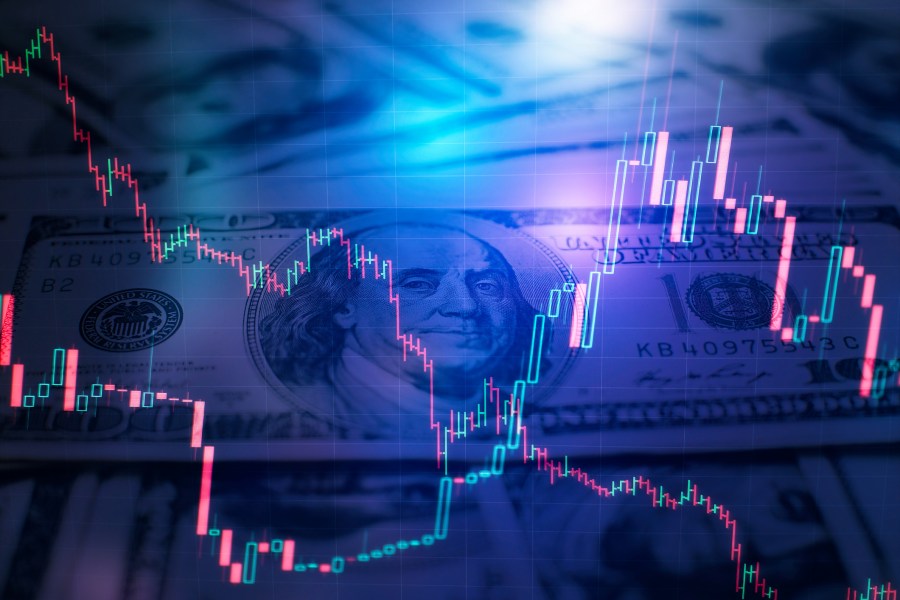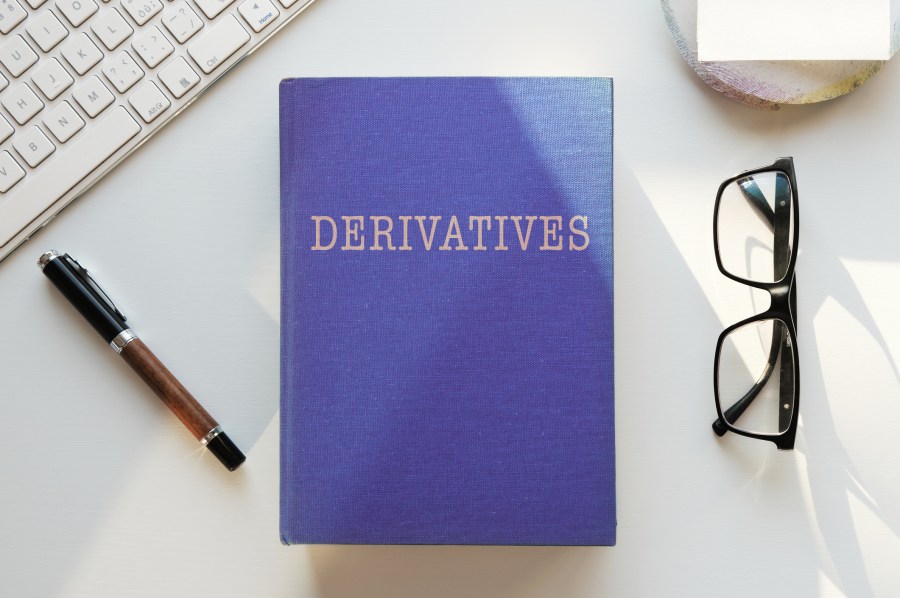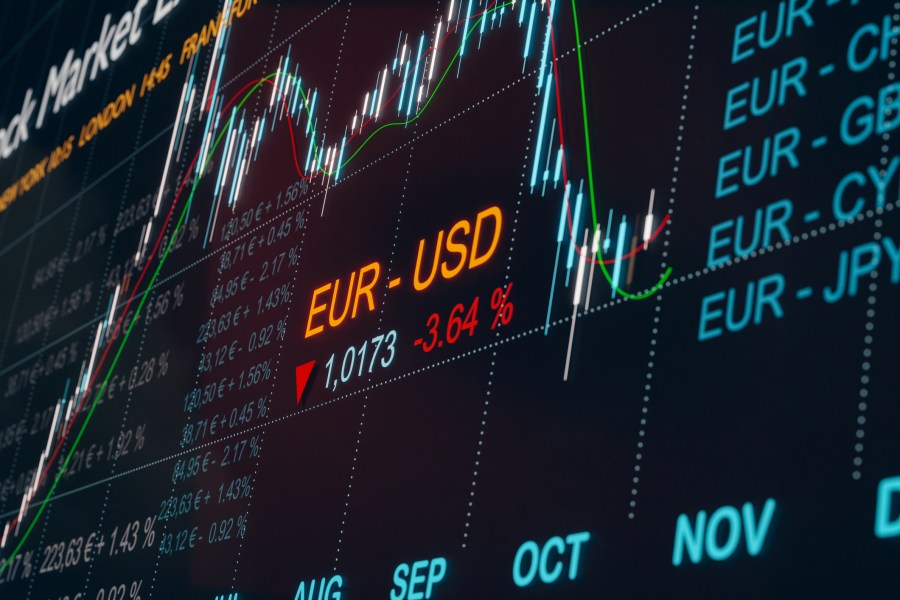How To Find Derivative Using Definition

When yous're looking for investment options beyond traditional choices like stocks, ETFs, and bonds, the world of derivatives may be appealing. Derivatives can also serve a critical office, allowing for hedging or speculation, which are harder to capture using more conventional options.
However, if you're new to this market, you may be wondering, "What is a derivatives contract?" If then, here's a expect at what they are, how they office, how they're used, the types available, and more.

According to the Role of the Comptroller of the Currency – which is function of the U.S. Section of the Treasury – "a derivative is a fiscal contract whose value is derived from the performance of underlying market factors, such as interest rates, currency substitution rates, and article, credit, and disinterestedness prices."
While financial or economic atmospheric condition play the largest part in pricing, they aren't the only influencers. Even non-financial instruments – such as the weather – can impact pricing for sure commodities, particularly those associated with nutrient production.
The proper noun "derivative" comes from the fact that the contract derives its value from the underlying asset. Since the value of the assets changes over time, so does the value of a derivative contract from an investment standpoint.
Equally with any form of investment, derivatives come with their own benefits and drawbacks. They create opportunities to hedge against risk or speculate, every bit well as lock in prices in advance. In some cases, they can lead to improve overall diversification, and they're often leverageable in a multifariousness of means.
When it comes to drawbacks, at that place can be challenges when it comes to valuing the contract. Additionally, over-the-counter (OTC) variants could be subject to counterparty default, making them risky. Finally, supply and demand influences are often strong, and these types of arrangements can be surprisingly tricky to empathise, making them challenging for investment novices.
How Derivative Contracts Work
Functionally, a derivative is a contract betwixt two or more parties, and the parties to the contract take contrary positions every bit to whether the underlying asset's value volition rise or autumn. When ane position becomes stronger than the other, purchasing a derivatives contract with that position by and large costs more than taking the opposing position.
Derivatives are tradable on exchanges or privately, the latter of which is referred to as over-the-counter trading. In many cases, derivatives are usually used as hedging instruments, assuasive an investor to start certain risks relating to their broader portfolio.
Nevertheless, derivatives can also be used for speculation. If there is reason to believe that the value of an underlying contract may shift in the coming months, investors may seek out related derivatives contracts that could back up futurity gains. The play a joke on here is finding another party who believes the contrary may occur. Additionally, simply i will ultimately come out ahead.
Examples of Using Derivative Contracts for Different Goals

A unproblematic example of hedging in the derivatives market is a European investor who buys U.Southward. stocks on a U.Southward. stock exchange. This investor is exposed to currency risk. He may meet his profits from the U.Due south. stocks dwindle or be lost entirely if the value of his domicile country's currency moves in the wrong management. To protect confronting this hazard, this investor might purchase a currency futures contract, a specific type of derivative fiscal instrument.
For speculation, the motivation is different. If an investor believes that a stock is undervalued, they may seek out a derivatives contract to potentially capitalize on future asset appreciation, should information technology occur. The contract allows the investor to commit to purchasing the nugget on a future date for the price listed today. If the price rises, they spend less than the asset is worth, resulting in a gain. Yet, if they're incorrect, they still have to proceed with the purchase, causing the other party to come out ahead.
Types of Derivative Contracts

There are several types of derivatives contracts available either through exchanges or over-the-counter. By and large, they're separated into ii categories: lock and option.
Locks include futures, forwards, and swaps. With these, both parties involved in the contract are bound past the terms and must purchase, sell, or swap assets at the initially agreed-upon price, regardless of how the value of the asset shifts during the contract menstruation.
Options – most traditionally stock options – give a person a right to purchase or sell an asset, simply don't come up with an obligation to do so. Equally a outcome, they can consider how the toll of the asset changes before making a decision, as long as one is made by the contract's expiration date. Since they're flexible, they can work well for both hedging and speculating, all without the risks associated with alternatives that include contractual obligations to proceed.
Are Futures Contracts Derivatives?

Futures contracts – also referred to every bit simply "futures" – are derivatives since their core value is determined by an underlying nugget and its operation over the contract period. This form of a derivative is traded on exchanges, including, but not express to, the Chicago Mercantile Exchange. That provides an actress layer of safety when compared to over-the-counter alternatives, as futures are regulated while OTC derivatives are not.
Generally, futures contracts are used primarily for speculation. As a result, investors are more likely to explore them if they believe the value of an asset is poised to rise or autumn significantly in the about term.
Forrad are as well derivatives contracts. Dissimilar futures, they are traded over the counter, so there's less regulation. This can make them far easier to customize and allows them to reverberate assets that aren't available through futures. They're a pop tool for hedging but can serve other purposes, but they do involve far more than risk than futures.
Are Derivatives Good Additions to Your Portfolio?

Whether derivatives are adept additions to your investment portfolio depends on your financial goals, risk tolerance, comfort level, and access to suitable exchanges or OTC marketplaces. Generally speaking, the complexity of these contracts makes them poor fits for beginners, especially those with smaller portfolios where hedging isn't as necessary.
Still, later educating yourself on how they work and if you lot're comfortable with the risks, they can add a new degree of diversification to your investment strategy. As a result, information technology'due south not a bad idea to keep them on the table, suggesting they piece of work well with your broader vision.
How To Find Derivative Using Definition,
Source: https://www.askmoney.com/investing/what-is-a-derivative-contract?utm_content=params%3Ao%3D1465803%26ad%3DdirN%26qo%3DserpIndex&ueid=9b1a4e05-9b9d-4cef-8116-9b13a02c774f
Posted by: harkinshicle1975.blogspot.com


0 Response to "How To Find Derivative Using Definition"
Post a Comment